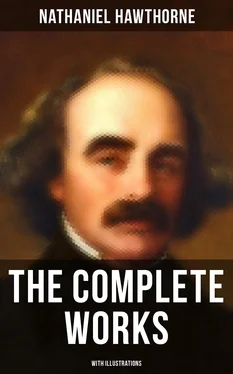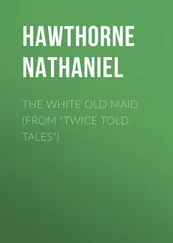Always, in his interviews with Phoebe, the artist made especial inquiry as to the welfare of Clifford, whom, except at the Sunday festival, he seldom saw.
“Does he still seem happy?” he asked one day.
“As happy as a child,” answered Phoebe; “but — like a child, too — very easily disturbed.”
“How disturbed?” inquired Holgrave. “By things without, or by thoughts within?”
“I cannot see his thoughts! How should I?” replied Phoebe with simple piquancy. “Very often his humor changes without any reason that can be guessed at, just as a cloud comes over the sun. Latterly, since I have begun to know him better, I feel it to be not quite right to look closely into his moods. He has had such a great sorrow, that his heart is made all solemn and sacred by it. When he is cheerful, — when the sun shines into his mind, — then I venture to peep in, just as far as the light reaches, but no further. It is holy ground where the shadow falls!”
“How prettily you express this sentiment!” said the artist. “I can understand the feeling, without possessing it. Had I your opportunities, no scruples would prevent me from fathoming Clifford to the full depth of my plummet-line!”
“How strange that you should wish it!” remarked Phoebe involuntarily. “What is Cousin Clifford to you?”
“Oh, nothing, — of course, nothing!” answered Holgrave with a smile. “Only this is such an odd and incomprehensible world! The more I look at it, the more it puzzles me, and I begin to suspect that a man’s bewilderment is the measure of his wisdom. Men and women, and children, too, are such strange creatures, that one never can be certain that he really knows them; nor ever guess what they have been from what he sees them to be now. Judge Pyncheon! Clifford! What a complex riddle — a complexity of complexities — do they present! It requires intuitive sympathy, like a young girl’s, to solve it. A mere observer, like myself (who never have any intuitions, and am, at best, only subtile and acute), is pretty certain to go astray.”
The artist now turned the conversation to themes less dark than that which they had touched upon. Phoebe and he were young together; nor had Holgrave, in his premature experience of life, wasted entirely that beautiful spirit of youth, which, gushing forth from one small heart and fancy, may diffuse itself over the universe, making it all as bright as on the first day of creation. Man’s own youth is the world’s youth; at least, he feels as if it were, and imagines that the earth’s granite substance is something not yet hardened, and which he can mould into whatever shape he likes. So it was with Holgrave. He could talk sagely about the world’s old age, but never actually believed what he said; he was a young man still, and therefore looked upon the world — that graybearded and wrinkled profligate, decrepit, without being venerable — as a tender stripling, capable of being improved into all that it ought to be, but scarcely yet had shown the remotest promise of becoming. He had that sense, or inward prophecy, — which a young man had better never have been born than not to have, and a mature man had better die at once than utterly to relinquish, — that we are not doomed to creep on forever in the old bad way, but that, this very now, there are the harbingers abroad of a golden era, to be accomplished in his own lifetime. It seemed to Holgrave, — as doubtless it has seemed to the hopeful of every century since the epoch of Adam’s grandchildren, — that in this age, more than ever before, the mossgrown and rotten Past is to be torn down, and lifeless institutions to be thrust out of the way, and their dead corpses buried, and everything to begin anew.
As to the main point, — may we never live to doubt it! — as to the better centuries that are coming, the artist was surely right. His error lay in supposing that this age, more than any past or future one, is destined to see the tattered garments of Antiquity exchanged for a new suit, instead of gradually renewing themselves by patchwork; in applying his own little life-span as the measure of an interminable achievement; and, more than all, in fancying that it mattered anything to the great end in view whether he himself should contend for it or against it. Yet it was well for him to think so. This enthusiasm, infusing itself through the calmness of his character, and thus taking an aspect of settled thought and wisdom, would serve to keep his youth pure, and make his aspirations high. And when, with the years settling down more weightily upon him, his early faith should be modified by inevitable experience, it would be with no harsh and sudden revolution of his sentiments. He would still have faith in man’s brightening destiny, and perhaps love him all the better, as he should recognize his helplessness in his own behalf; and the haughty faith, with which he began life, would be well bartered for a far humbler one at its close, in discerning that man’s best directed effort accomplishes a kind of dream, while God is the sole worker of realities.
Holgrave had read very little, and that little in passing through the thoroughfare of life, where the mystic language of his books was necessarily mixed up with the babble of the multitude, so that both one and the other were apt to lose any sense that might have been properly their own. He considered himself a thinker, and was certainly of a thoughtful turn, but, with his own path to discover, had perhaps hardly yet reached the point where an educated man begins to think. The true value of his character lay in that deep consciousness of inward strength, which made all his past vicissitudes seem merely like a change of garments; in that enthusiasm, so quiet that he scarcely knew of its existence, but which gave a warmth to everything that he laid his hand on; in that personal ambition, hidden — from his own as well as other eyes — among his more generous impulses, but in which lurked a certain efficacy, that might solidify him from a theorist into the champion of some practicable cause. Altogether in his culture and want of culture, — in his crude, wild, and misty philosophy, and the practical experience that counteracted some of its tendencies; in his magnanimous zeal for man’s welfare, and his recklessness of whatever the ages had established in man’s behalf; in his faith, and in his infidelity; in what he had, and in what he lacked, — the artist might fitly enough stand forth as the representative of many compeers in his native land.
His career it would be difficult to prefigure. There appeared to be qualities in Holgrave, such as, in a country where everything is free to the hand that can grasp it, could hardly fail to put some of the world’s prizes within his reach. But these matters are delightfully uncertain. At almost every step in life, we meet with young men of just about Holgrave’s age, for whom we anticipate wonderful things, but of whom, even after much and careful inquiry, we never happen to hear another word. The effervescence of youth and passion, and the fresh gloss of the intellect and imagination, endow them with a false brilliancy, which makes fools of themselves and other people. Like certain chintzes, calicoes, and ginghams, they show finely in their first newness, but cannot stand the sun and rain, and assume a very sober aspect after washing-day.
But our business is with Holgrave as we find him on this particular afternoon, and in the arbor of the Pyncheon garden. In that point of view, it was a pleasant sight to behold this young man, with so much faith in himself, and so fair an appearance of admirable powers, — so little harmed, too, by the many tests that had tried his metal, — it was pleasant to see him in his kindly intercourse with Phoebe. Her thought had scarcely done him justice when it pronounced him cold; or, if so, he had grown warmer now. Without such purpose on her part, and unconsciously on his, she made the House of the Seven Gables like a home to him, and the garden a familiar precinct. With the insight on which he prided himself, he fancied that he could look through Phoebe, and all around her, and could read her off like a page of a child’s story-book. But these transparent natures are often deceptive in their depth; those pebbles at the bottom of the fountain are farther from us than we think. Thus the artist, whatever he might judge of Phoebe’s capacity, was beguiled, by some silent charm of hers, to talk freely of what he dreamed of doing in the world. He poured himself out as to another self. Very possibly, he forgot Phoebe while he talked to her, and was moved only by the inevitable tendency of thought, when rendered sympathetic by enthusiasm and emotion, to flow into the first safe reservoir which it finds. But, had you peeped at them through the chinks of the garden-fence, the young man’s earnestness and heightened color might have led you to suppose that he was making love to the young girl!
Читать дальше












